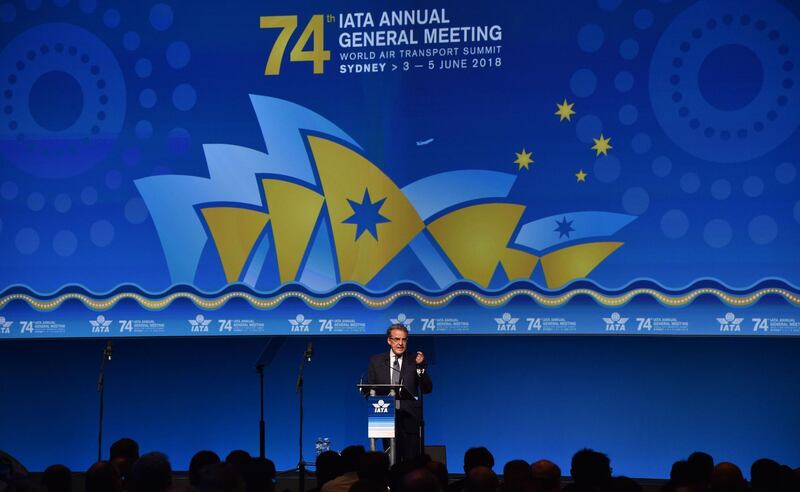Middle East carriers registered double-digit growth in international passenger traffic in June, outperforming other regions, as demand improved from a year ago following the reversal of US travel restrictions.
Regional airlines posted 11 per cent growth in revenue per passenger kilometre -- a measure of passenger volumes--in June from the same month last year, the International Air Transport Association (IATA) said.
The sharp increase in June resulted from the removal of "unfavourable developments in the year-ago period, including the ban on large portable electronic devices, as well as the travel restrictions imposed by the US for visitors from certain Middle East and African countries," IATA said in its monthly report.
In March 2017, the United States restricted the use of electronic devices on US-bound flights from 10 Middle East airports citing security measures to prevent terrorist threats. The four-month ban, one of the controversial travel restrictions imposed by President Donald Trump’s administration, slashed demand for US flights on regional carriers. The ban was reversed in July last year after regional airports implemented new security measures approved by the US.
Regional airlines' capacity rose eight percent and their load factor climbed 1.9 percentage points to 71 per cent in June from a year earlier.
"Part of the expected improved performance over the coming months will reflect those developments of a year ago," IATA said.
_____________
Read more:
[ Summer air travel misery for passengers as flight delays more than double across Europe ]
[ Middle East carriers to need 2,990 new aircraft over 20 years, says Boeing ]
_____________
The performance of Middle East carriers in the second half of 2018 is set to improve from a year earlier as a long-drawn spat between US and Arabian Gulf carriers on subsidy allegations is largely resolved through government talks and US-imposed travel restrictions ease, industry experts said.
"The issues that pressured growth in 2017 were largely tackled and the effects of geopolitical tensions have been absorbed, therefore 2018 should be more positive than last year for Arab carriers," Abdul Wahab Teffaha, secretary-general of the Arab Air Carriers Organisation, said.
However, there is some turbulence ahead as Middle East carriers, particularly the super-connectors in the Gulf, may see yields squeezed by higher fuel bills, a strengthening dollar and currency volatility during the second half, analysts said.
"These certainly aren't the best of times," Mark Martin, head of aviation advisory Martin Consultancy, said. "Yields will depend on two predominant factors: the dollar along with other currency movements and the price of oil."
Rising oil prices have meant higher premium bookings for Gulf airlines as regional economies rebound from a three-year slump in crude prices but also translate into higher fuel costs.
"An increase in oil prices, uncertainty around Brexit, and the threat of trade wars will pressure the growth of Arab carriers as well as global operators," Mr Teffaha said. "Brexit and trade wars cause uncertainty, which impacts confidence in the future of travel and tourism."
Emirates, the world's biggest airline by international traffic, has said it would explore ways to work more closely with Abu Dhabi's Etihad Airways. The two UAE-based airlines would consider joint purchases and sharing facilities in countries they both fly to, Emirates chairman Sheikh Ahmed bin Saeed Al Maktoum said in May.
Meanwhile, global air passenger demand grew 7.8 per cent in June year-on-year, IATA said.
"The first half of 2018 concluded with another month of above-trend demand growth, which is a good indicator for the peak summer travel season in the northern hemisphere," said Alexandre de Juniac, IATA’s Director General and CEO.
The organisation reiterated its concerns that trade restrictions and rising oil prices would impact the profitability of airlines this year, after it slashed its forecast for the industry's annual profits by 12 per cent.
"The looming prospect of a global trade war is casting a long shadow," Mr de Juniac said. "Additionally, rising cost inputs—fuel prices have soared by approximately 60 per cent over the past year—are reducing the stimulus of lower fares."







